人教新目标(Go for it)版Unit10 You’re supposed to shake hands. 复习课件(共37张PPT)
文档属性
| 名称 | 人教新目标(Go for it)版Unit10 You’re supposed to shake hands. 复习课件(共37张PPT) | 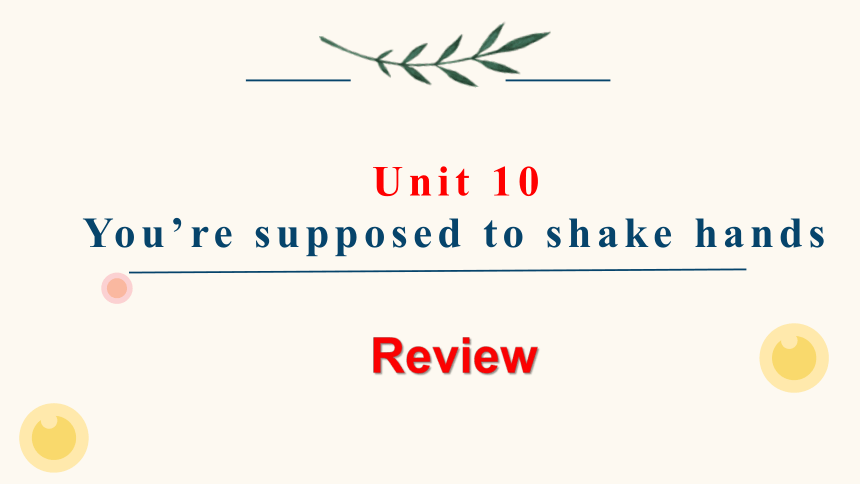 | |
| 格式 | pptx | ||
| 文件大小 | 707.3KB | ||
| 资源类型 | 教案 | ||
| 版本资源 | 人教新目标(Go for it)版 | ||
| 科目 | 英语 | ||
| 更新时间 | 2021-03-02 13:09:23 | ||
图片预览

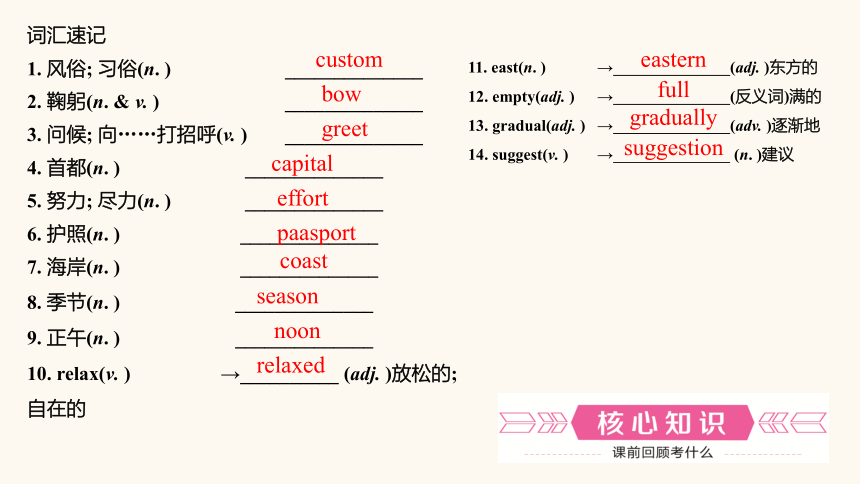
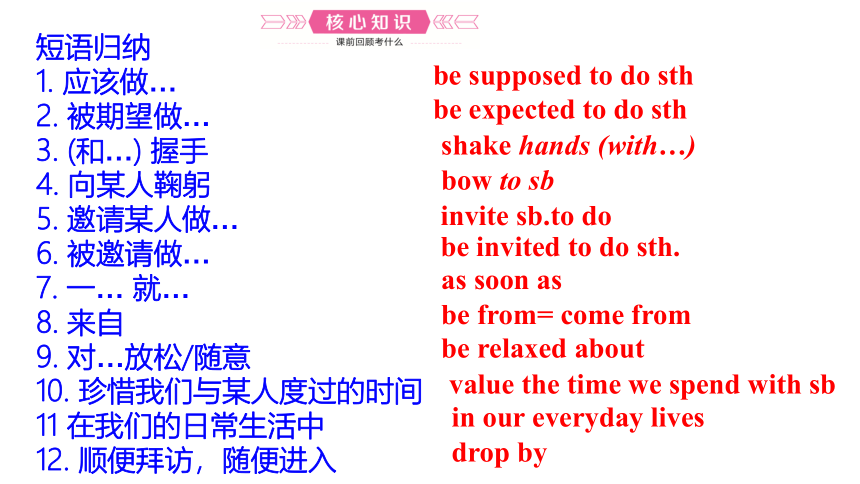
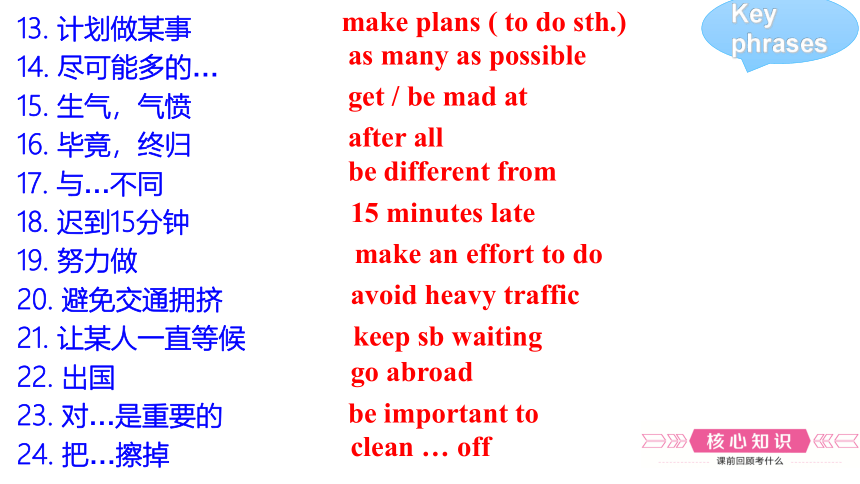
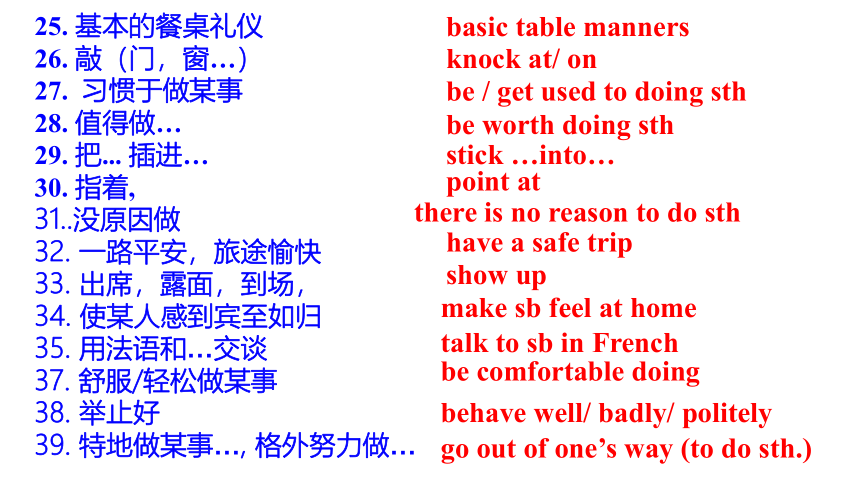
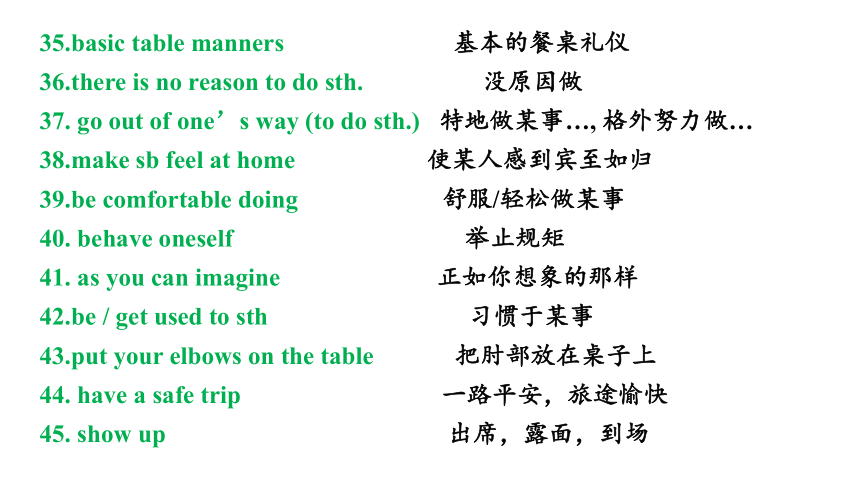

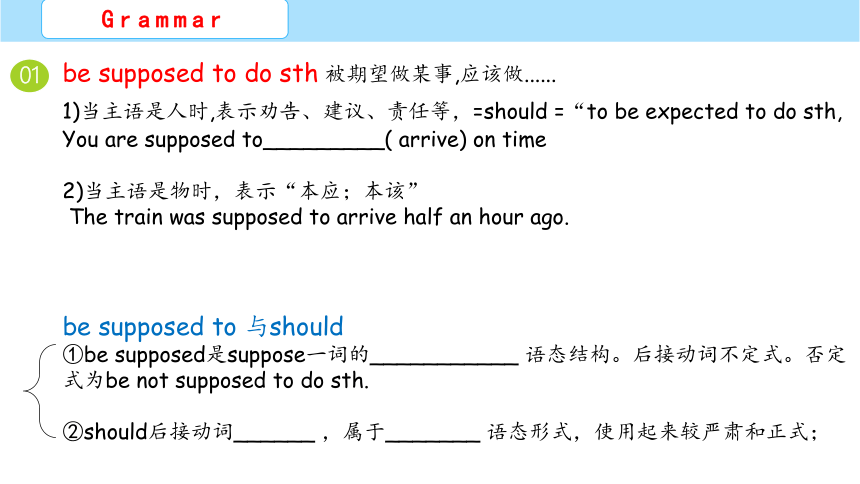
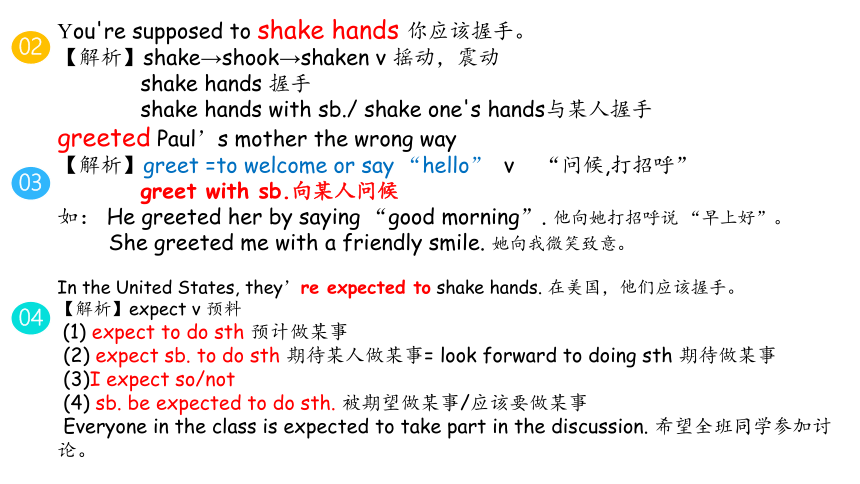
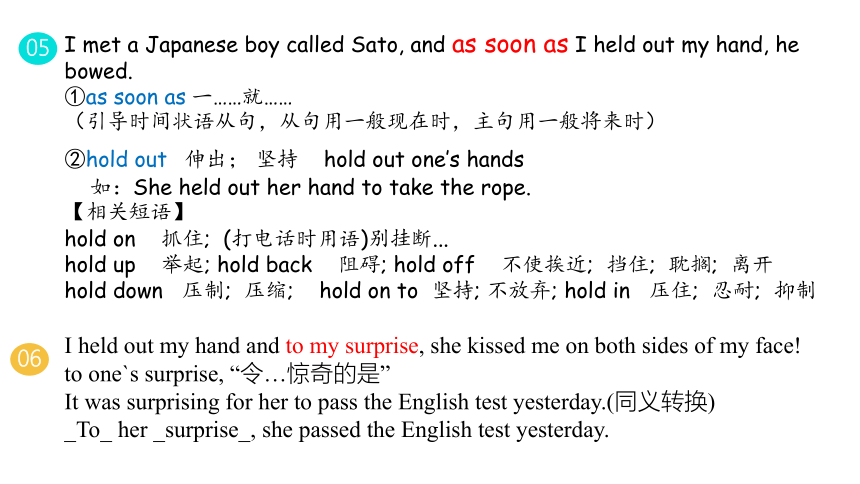
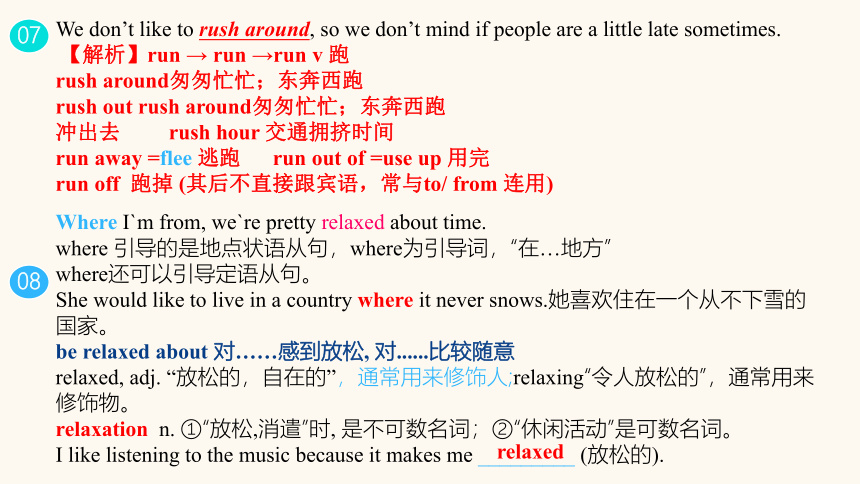
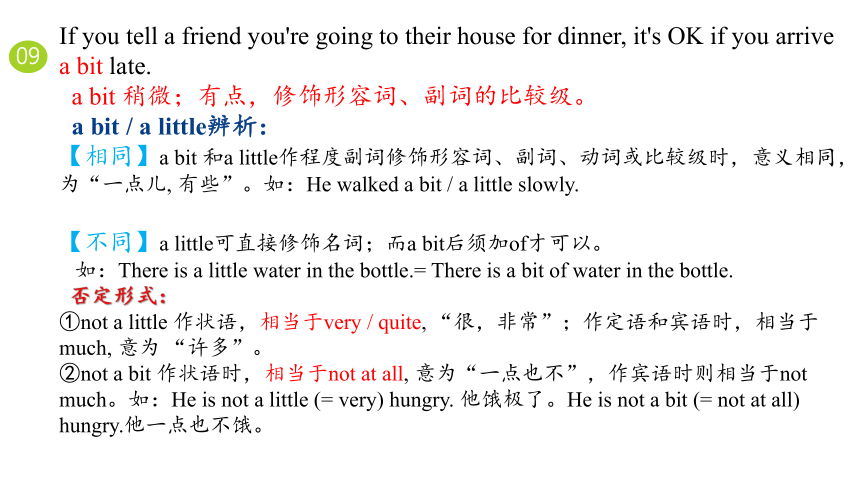
文档简介
(共37张PPT)
Unit 10
You’re supposed to shake hands
Review
词汇速记
1. 风俗; 习俗(n. ) ______________
2. 鞠躬(n. & v. ) ______________
3. 问候; 向……打招呼(v. ) ______________
4. 首都(n. ) ______________
5. 努力; 尽力(n. ) ______________
6. 护照(n. ) ______________
7. 海岸(n. ) ______________
8. 季节(n. ) ______________
9. 正午(n. ) ______________
10. relax(v. ) →__________ (adj. )放松的; 自在的
custom
bow
greet
capital
effort
paasport
coast
11. east(n. ) → (adj. )东方的
12. empty(adj. ) → (反义词)满的
13. gradual(adj. ) → (adv. )逐渐地
14. suggest(v. ) → (n. )建议
season
noon
relaxed
eastern
full
gradually
suggestion
短语归纳
1. 应该做…
2. 被期望做…
3. (和…) 握手
4. 向某人鞠躬
5. 邀请某人做…
6. 被邀请做…
7. 一… 就…
8. 来自
9. 对…放松/随意
10. 珍惜我们与某人度过的时间
11 在我们的日常生活中
12. 顺便拜访,随便进入
be supposed to do sth
be expected to do sth
shake hands (with…)
bow to sb
invite sb.to do
be invited to do sth.
as soon as
be from= come from
be relaxed about
value the time we spend with sb
in our everyday lives
drop by
Key phrases
13. 计划做某事
14. 尽可能多的…
15. 生气,气愤
16. 毕竟,终归
17. 与…不同
18. 迟到15分钟
19. 努力做
20. 避免交通拥挤
21. 让某人一直等候
22. 出国
23. 对…是重要的
24. 把…擦掉
make plans ( to do sth.)
as many as possible
get / be mad at
after all
be different from
15 minutes late
make an effort to do
avoid heavy traffic
keep sb waiting
go abroad
be important to
clean … off
25. 基本的餐桌礼仪
26. 敲(门,窗…)
27. 习惯于做某事
28. 值得做…
29. 把... 插进…
30. 指着,
31..没原因做
32. 一路平安,旅途愉快
33. 出席,露面,到场,
34. 使某人感到宾至如归
35. 用法语和…交谈
37. 舒服/轻松做某事
38. 举止好
39. 特地做某事…, 格外努力做…
basic table manners
knock at/ on
be worth doing sth
be / get used to doing sth
stick …into…
point at
there is no reason to do sth
have a safe trip
show up
make sb feel at home
talk to sb in French
be comfortable doing
behave well/ badly/ politely
go out of one’s way (to do sth.)
35.basic table manners 基本的餐桌礼仪
36.there is no reason to do sth. 没原因做
37. go out of one’s way (to do sth.) 特地做某事…, 格外努力做…
38.make sb feel at home 使某人感到宾至如归
39.be comfortable doing 舒服/轻松做某事
40. behave oneself 举止规矩
41. as you can imagine 正如你想象的那样
42.be / get used to sth 习惯于某事
43.put your elbows on the table 把肘部放在桌子上
44. have a safe trip 一路平安,旅途愉快
45. show up 出席,露面,到场
知识点复习
be supposed to do sth 被期望做某事,应该做......
1)当主语是人时,表示劝告、建议、责任等,=should =“to be expected to do sth,
You are supposed to_________( arrive) on time
2)当主语是物时,表示“本应;本该”
The train was supposed to arrive half an hour ago.
be supposed to 与should
①be supposed是suppose一词的___________ 语态结构。后接动词不定式。否定式为be not supposed to do sth.
②should后接动词______ ,属于_______ 语态形式,使用起来较严肃和正式;
Grammar
01
You're supposed to shake hands 你应该握手。
【解析】shake→shook→shaken v 摇动,震动
shake hands 握手
shake hands with sb./ shake one's hands与某人握手
greeted Paul’s mother the wrong way
【解析】greet =to welcome or say “hello” v “问候,打招呼”
greet with sb.向某人问候
如: He greeted her by saying “good morning”. 他向她打招呼说 “早上好”。
She greeted me with a friendly smile. 她向我微笑致意。
In the United States, they’re expected to shake hands. 在美国,他们应该握手。
【解析】expect v 预料
(1) expect to do sth 预计做某事
(2) expect sb. to do sth 期待某人做某事= look forward to doing sth 期待做某事
(3)I expect so/not
(4) sb. be expected to do sth. 被期望做某事/应该要做某事
Everyone in the class is expected to take part in the discussion. 希望全班同学参加讨论。
02
03
04
I met a Japanese boy called Sato, and as soon as I held out my hand, he bowed.
①as soon as 一……就……
(引导时间状语从句,从句用一般现在时,主句用一般将来时)
②hold out 伸出; 坚持 hold out one’s hands
如:She held out her hand to take the rope.
【相关短语】
hold on 抓住; (打电话时用语)别挂断...
hold up 举起; hold back 阻碍; hold off 不使挨近; 挡住; 耽搁; 离开
hold down 压制; 压缩; hold on to 坚持; 不放弃; hold in 压住; 忍耐; 抑制
05
I held out my hand and to my surprise, she kissed me on both sides of my face!
to one`s surprise, “令…惊奇的是”
It was surprising for her to pass the English test yesterday.(同义转换)
_To_ her _surprise_, she passed the English test yesterday.
06
We don’t like to rush around, so we don’t mind if people are a little late sometimes.
【解析】run → run →run v 跑
rush around匆匆忙忙;东奔西跑
rush out rush around匆匆忙忙;东奔西跑
冲出去 rush hour 交通拥挤时间
run away =flee 逃跑 run out of =use up 用完
run off 跑掉 (其后不直接跟宾语,常与to/ from 连用)
07
Where I`m from, we`re pretty relaxed about time.
where 引导的是地点状语从句,where为引导词,“在…地方”
where还可以引导定语从句。
She would like to live in a country where it never snows.她喜欢住在一个从不下雪的国家。
be relaxed about 对……感到放松, 对......比较随意
relaxed, adj. “放松的,自在的”,通常用来修饰人;relaxing“令人放松的”,通常用来修饰物。
relaxation n. ①“放松,消遣”时, 是不可数名词;②“休闲活动”是可数名词。
I like listening to the music because it makes me _________ (放松的).
relaxed
08
If you tell a friend you're going to their house for dinner, it's OK if you arrive a bit late.
a bit 稍微;有点,修饰形容词、副词的比较级。
a bit / a little辨析:
【相同】a bit 和a little作程度副词修饰形容词、副词、动词或比较级时,意义相同,为“一点儿, 有些”。如:He walked a bit / a little slowly.
【不同】a little可直接修饰名词;而a bit后须加of才可以。
如:There is a little water in the bottle.= There is a bit of water in the bottle.
否定形式:
①not a little 作状语,相当于very / quite, “很,非常”;作定语和宾语时,相当于much, 意为 “许多”。
②not a bit 作状语时,相当于not at all, 意为“一点也不”,作宾语时则相当于not much。如:He is not a little (= very) hungry. 他饿极了。He is not a bit (= not at all) hungry.他一点也不饿。
09
用a bit或a little填空。
1. There is _________ time left.
2. This will give us a _________ of time.
3. He went to sleep soon, for he was not _________ tired.
4. I don't want to stop to have a rest, because I am not _________ tired.
We value the time we spend with our family and friends in our everyday lives.
value v “重视;珍视 n “价值” → valuable adj. 贵重的;宝贵的
every day / everyday辨析
①every day 每天= each day 做状语,放在句末,对其提问用 how often.
如:He exercises every day.
②everyday adj. 每天的 ,作定语,修饰名词,放在名词之前。
如:Cooking breakfast is her everyday job.
10
----Let`s do something for our dad.
----Good idea. We should always ___________ father`s love for us.
A. explain B. suppose C. wonder D. value
We often just drop by our friends’ homes if we have time如果我们有时间,我们经常回顺便拜访朋友家。
【解析】 drop by 顺便拜访/偶然拜访= come over to / drop in;可以直接使用,也可以在by后面加表示地点的词。
Drop by often when you are free.有空时常来拜访。
drop by sb. = drop in on sb. 顺便走访某人
drop by one’s home = drop in (at) +地点 拜访…
【拓展】drop in“拜访,到访”, 后接人时,要借助于介词on;drop in on sb. 后接地点时要借助于介词at。
Don’t forget to drop in on your teacher.
= Don’t forget to drop in at your teacher’s home. 不要忘了顺便去拜访一下你的老师。
So I make an effort to be on time when I meet my friends
【解析】make an effort to do sth 努力做某事
11
12
If you’re even 15 minutes late, your friend may get mad.
mad adj. 很生气;疯的
get mad 大动肝火,气愤(强调动作和过程)
be mad 感觉很生气(表示状态)
be mad at sb.= be angry with sb. ==对某人生气
be/ get mad about sth. 因某事而生气
We usually plan to do something interesting, or go somewhere together.
【解析1】plan to do 计划做某事
【解析2】 go somewhere 去某地
somewhere adv. 在某处;到某处,副词, 前面不可用介词。
【拓展】somewhere常用于肯定句中, anywhere(任何地方)常用于否定句和疑问句中。在疑问句中, 可以用somewhere或anywhere, 如果期望对方回答“是”, 就用somewhere;如果不知道对方会回答“是”还是“不是”, 用somewhere、 anywhere都可以。
14
13
I always leave the house early to avoid heavy traffic.
①avoid v 避免 (后接Ving)
【拓展】后接ving 形式作宾语的动词还有:
②traffic n. 交通; 路上行驶的车辆
heavy traffic 交通繁忙, 交通拥堵, 车水马龙
15
后接ving形式的动词
avoid 避免
mind 介意
suggest 建议
enjoy 喜欢
practice 练习
Keep 保持
When you go abroad, it is important to bring your passport.
【解析】abroad adv 在国外;到国外 My father often goes abroad.
abroad 用法:表示到(在)国外,是一个副词,前面不加介词。
go abroad 出国 live abroad 住在国外 at home and abroad 在国内外
After class, students are expected to clean the chalk off the blackboard.
【解析】clean ... off 把......擦掉
【拓展】clean up 把……打扫干净(v. + adv.) clean up the table = clean the table up
clean out 把…内部彻底打扫干净
Many volunteers will help to _________ the city parks next Friday.
A. give up B. pick up C. clean up
16
17
If there are people in the meeting room, you are supposed to knock before entering.
knock, v. “敲,击” knock at/on the door 敲门
v. 碰撞, knock into 与…相撞; knock down 撞到
n. 敲击声;敲击 There is a knock at the door.
In many eastern European countries, you take off your gloves before shaking hands.
【解析】 take off 脱下/(飞机等)起飞
take ( take →took → taken) v 带来, 从(讲话者)拿走
【短语】 take care 小心 take charge of 负责,看管
take hold of 握住 take out 取出 take a look 看一看
take away 拿走 take exercise 做运动
take it easy 不紧张 take one’s time 从容不迫
…,but it is worth the trouble if you want to understand another culture.
worth 值的,有…的价值 adj. 作表语。“be worth + n.值得”结构中, 名词为金钱时,表示“……值……钱”。be worth doing sth.值得做某事
The book is excellent. It's worth reading a second time.
18
19
20
InChina,it’s impolite to stick your chopsticks into your food.
①stick V. 插入,刺入 stick … into把……插入……
②伸出 He stuck his tongue out at his teacher.
③粘贴,张贴 Stick a stamp on a letter. stick to坚持
stick n.树枝,木棍,拐杖
In China, it`s impolite to use your chopsticks to hit an empty bowl.
empty, adj. “空的,空洞的” 反义:full 满的
v. “把…弄空;倒空” 反义:fill 装满 Please empty the box first.
I`m having a great time on my student exchange program in France.
exchange n.”交换” in exchange for交换…… v. “交换” exchange ...for...用……交换……
I was a bit nervous before I arrived here, but there was no reason to be .
there is no reason to do sth. 没有理由做某事。
I have no reason to quarrel with him.我没有理由跟她争吵。
21
22
23
24
They go out of their way to make me feel at home.
①go out of one’s way 特地;格外努力
go out of one’s way to do sth = try one’s best to do sth 竭力做好某事
如:He went out of his way _______________(make) me happy.
【 与way有关的短语】
in no way 决不 by the way 顺便提一下,另外
in a way 在某点,在某种程度上 get in the way 挡道
in one's / the way 妨碍,阻碍 in this way 用这种方法
lose one's way 迷路 on the / one's way (to) 在去……的路上
②make sb. feel at home 使某人感到宾至如归
make mistake 犯错误 make a decision 做决定
make one’s bed 整理床铺 make a noise 制造噪音
make faces 做鬼脸 make friends 交朋友
25
I’m very comfortable speaking French now.
【解析】be comfortable doing sth. 做某事很轻松, 乐意做某事
I feel comfortable talking with you. 和你讲话感觉很舒服。
My biggest challenge is learning how to behave at the dinner table(2b)
【解析】动名词短语“learning how to…”在句中作表语;“how to behave…”是“特殊疑问词+动词不定式”结构,在句中作learning的宾语,相当于由特殊疑问词引导的宾语从句。
behave v. 表现;举止 → behavior n. 行为;举止;习性;态度
He behaves himself like a man. 他表现得像一男子汉。
I thought that was pretty strange at first, ...
【解析】pretty (1)adv“颇;相当地” 常用于口语,只可以修饰其他形容词或副词。After six months, I could speak Chinese pretty well.6个月之后, 我就能讲相当好的汉语了。
(2)adj. 漂亮的;秀丽的;好看的。What a pretty little garden! 多么漂亮的小花园!
【注】pretty语气较beautiful弱,且大多用来指年轻的女性, 一般不用来描写成年男性。pretty也可以用于男女儿童, 表示漂亮、活泼、可爱。
26
27
28
.… you’re not supposed to eat anything with your hands except bread …
①except“除......之外”,不包括所说的东西。例:I get up early except Sunday. (不包括星期天)
②besides的意思是“除了......之外,还有”。例:Five others are late besides me. (包含我在内)
except, prep. =but 表示在一个整体中,除去一个或多个(人或物)以外的其他全部都…即强调不包括,一般用来排除同类事物。
except for 除…之外,除一点外的其他各部分(除去瑕疵,强调整体)
besides, 除…之外还有,含有肯定的,附加的。
----Alice, would you like to go hiking with us
----What a pity! I am free every day ________ today.
A. for B. except C. besides D. among
29
…, but I gradually getting used to it. 但是我逐渐习惯。
【解析】get used to = be used to,“习惯于某事或做某事的意思”,to为介词,后接名词或动名词,不能跟动词原形。
They have got used to getting up early in the morning. 他们已习惯早起。
be / get used to结构可以用于各种时态中。
You’ll be / get used to the work soon. 你不久就会习惯这个工作的
【注意】在学习be used to结构时,一定要注意它与以下几个结构的区别:
used to do sth.意为“过去常常”,在这里to是动词不定式符号;
be used to do sth.和be used for doing sth.意为“被用来做某事”, 是被动结构。
You have to cut it up and eat it with a fork.你必须把它切碎,用叉子吃。
【解析】cut up 切碎;切开= cut into pieces
【拓展】与cut有关的短语
cut down 砍倒 cut one’s hair 理发 cut up 切碎
cut in 插嘴 cut off切断,停止
31
30
keep sb. doing sth.让某人一直做某事
keep (on) doing sth. 一直做某事
keep sb. from doing sth.= stop sb.(from) doing sth.= prevent sb. (from) doing sth. 阻止某人做某事
其他短语:
keep away from …与…保持距离 keep… out of… 阻止…进入
keep off…远离,避开
keep+ adj. 保持(某种状态)∕keep+n.+adj. 使…保持(某种状态)
keep a pet 饲养一个宠物
Let me give you some suggestions and advice about Chinese customs.
①give sb. some suggestions and advice 给某人提出一些建议和意见
make/ offer a suggestion 提出建议;ask for a suggestion 征求建议
②suggest v. 建议 suggest/ advise doing sth.
suggest + that 从句(用虚拟语气 should 可以省略)
We suggested / advised putting off the sports meet.
She suggests that we should start early tomorrow.
③suggest v. 暗示 What he said suggested he was honest.
④advice n. 不可数;忠告,劝告,建议
a piece of advice 一条建议 some pieces of advice/ some advice 一些建议
advise v. advise doing sth. 建议做某事 advise sb. to do sth.建议某人做某事
31
31
语法复习
动词不定式
1.作主语
2.作宾语
3.作宾语补足语
4.作定语
5.作状语
6. 作表语
动词不定式的基本形式是“to+动词原形”,其否定形式是“not to+动词原形”。
动词不定式没有人称和数的变化,在句中除了不能作谓语外,可以充当主语、宾语、宾语补足语、定语、状语等句子成分。
1.作主语
不定式短语作主语时,常用it 作形式主语,而将真正的主语置于系表结构之后,即“It is+形容词/副词+不定式.”。
如:It is not easy to keep milk fresh in such hot days.
2.作宾语
常跟不定式作宾语的动词有want, try, agree, decide, hope, expect, plan等。
如:I want to be a teacher in the future.
3.作宾语补足语
常跟不定式作宾语补足语的动词有tell, want, ask, advise, expect等。
如:I want her to come here right now.
注意:还有一些使役动词和感官动词也用不定式作宾补,这时不定式要省略to。这些动词有:
一感(feel)
二听(hear, listen to)
三让(let, make, have)
四看(look at, see, watch, notice)
但变被动语态时,必须加上to。
如: My friends were made to work the whole night by the boss.
4.作定语
不定式作定语时,常置于被修饰的名词或代词之后。
如:I have a lot of homework to do.我有许多作业要做。
5.作状语
不定式作状语时,可表示目的、原因、结果等。
如:I came here to see you . (目的)
We were very excited to hear the news. (原因)
He hurried to the school to find nobody there. (结果)
6. 作表语
多数情况下,不定式作表语,可转换作为主语
如:My work is to clean the room everyday.
=To clean the room every day is my work.
语法整合真题练
1. “How am I supposed ________ (live) without you ” Jane said to Dad, tears in eyes. 【2018·无锡】
【点拨】此处用到固定短语be supposed to do sth. 表示“应该做某事”。故填to live。
to live
2. — Henry, you _______ tell the teacher if you want to go out of the classroom.
— Sorry, sir. 【中考·贵阳】
A. are supposed to B. are surprised to
C. are afraid to
A
3. — Could I go swimming with my friend, dad
— No, it’s very dangerous for you kids ____ swimming without adults. 【2018·河池】
A. go B. going C. to go D. went
【点拨】句意:——爸爸,我可以和我的朋友去游泳吗?——不可以。对你们孩子来说,在没有大人的看护下去游泳是危险的。固定用法:It's +形容词+ for sb. to do sth. 意为“对某人来说做某事是……的”,其中动词不定式to do sth. 作句子真正的主语。故选C。
C
4. It’s very dangerous for us ________ the mobile phone while crossing the street. 【2018·益阳】
A. Answering B. to answer C. answer
B
5. 学生在校期间应该穿校服。 【中考·鞍山】
Students are _______ ______ wear school uniforms on school days.
supposed to
二、高频考点真题练
6. Except for working hard, we should give more attention to proper exercise and enough sleep. ______ , health always comes first. 【2018·山西】
A. For example B. After all C. So far
B
【点拨】句意:除了努力工作以外,我们应该更加关注适当的锻炼和足够的睡眠。毕竟,健康总是第一位的。for example例如;after all毕竟;so far到目前为止。根据句意可知选 B。
7. _______ your help, I can’t get good grades.
【2018·怀化】
A. With B. Without C. For
B
8. Jenny is afraid to travel by plane. She always feels _____ when getting on it. 【2017·青岛】
A. nervous B. interested C. relaxed D. happy
A
【点拨】句意:珍妮害怕乘坐飞机旅行。当登上飞机的时候,她总是感到紧张。nervous紧张的;interested感兴趣的;relaxed放松的;happy开心的。根据第一句珍妮害怕坐飞机,那么她坐飞机时自然就会感到紧张。
9. — Waiter, there’s a fly (苍蝇) swimming in my soup.
— So what do you ______ me to do, to call a lifeguard (救生员) 【2017·东营】
A. warn B. expect C. invite D. encourage
B
Unit 10
You’re supposed to shake hands
Review
词汇速记
1. 风俗; 习俗(n. ) ______________
2. 鞠躬(n. & v. ) ______________
3. 问候; 向……打招呼(v. ) ______________
4. 首都(n. ) ______________
5. 努力; 尽力(n. ) ______________
6. 护照(n. ) ______________
7. 海岸(n. ) ______________
8. 季节(n. ) ______________
9. 正午(n. ) ______________
10. relax(v. ) →__________ (adj. )放松的; 自在的
custom
bow
greet
capital
effort
paasport
coast
11. east(n. ) → (adj. )东方的
12. empty(adj. ) → (反义词)满的
13. gradual(adj. ) → (adv. )逐渐地
14. suggest(v. ) → (n. )建议
season
noon
relaxed
eastern
full
gradually
suggestion
短语归纳
1. 应该做…
2. 被期望做…
3. (和…) 握手
4. 向某人鞠躬
5. 邀请某人做…
6. 被邀请做…
7. 一… 就…
8. 来自
9. 对…放松/随意
10. 珍惜我们与某人度过的时间
11 在我们的日常生活中
12. 顺便拜访,随便进入
be supposed to do sth
be expected to do sth
shake hands (with…)
bow to sb
invite sb.to do
be invited to do sth.
as soon as
be from= come from
be relaxed about
value the time we spend with sb
in our everyday lives
drop by
Key phrases
13. 计划做某事
14. 尽可能多的…
15. 生气,气愤
16. 毕竟,终归
17. 与…不同
18. 迟到15分钟
19. 努力做
20. 避免交通拥挤
21. 让某人一直等候
22. 出国
23. 对…是重要的
24. 把…擦掉
make plans ( to do sth.)
as many as possible
get / be mad at
after all
be different from
15 minutes late
make an effort to do
avoid heavy traffic
keep sb waiting
go abroad
be important to
clean … off
25. 基本的餐桌礼仪
26. 敲(门,窗…)
27. 习惯于做某事
28. 值得做…
29. 把... 插进…
30. 指着,
31..没原因做
32. 一路平安,旅途愉快
33. 出席,露面,到场,
34. 使某人感到宾至如归
35. 用法语和…交谈
37. 舒服/轻松做某事
38. 举止好
39. 特地做某事…, 格外努力做…
basic table manners
knock at/ on
be worth doing sth
be / get used to doing sth
stick …into…
point at
there is no reason to do sth
have a safe trip
show up
make sb feel at home
talk to sb in French
be comfortable doing
behave well/ badly/ politely
go out of one’s way (to do sth.)
35.basic table manners 基本的餐桌礼仪
36.there is no reason to do sth. 没原因做
37. go out of one’s way (to do sth.) 特地做某事…, 格外努力做…
38.make sb feel at home 使某人感到宾至如归
39.be comfortable doing 舒服/轻松做某事
40. behave oneself 举止规矩
41. as you can imagine 正如你想象的那样
42.be / get used to sth 习惯于某事
43.put your elbows on the table 把肘部放在桌子上
44. have a safe trip 一路平安,旅途愉快
45. show up 出席,露面,到场
知识点复习
be supposed to do sth 被期望做某事,应该做......
1)当主语是人时,表示劝告、建议、责任等,=should =“to be expected to do sth,
You are supposed to_________( arrive) on time
2)当主语是物时,表示“本应;本该”
The train was supposed to arrive half an hour ago.
be supposed to 与should
①be supposed是suppose一词的___________ 语态结构。后接动词不定式。否定式为be not supposed to do sth.
②should后接动词______ ,属于_______ 语态形式,使用起来较严肃和正式;
Grammar
01
You're supposed to shake hands 你应该握手。
【解析】shake→shook→shaken v 摇动,震动
shake hands 握手
shake hands with sb./ shake one's hands与某人握手
greeted Paul’s mother the wrong way
【解析】greet =to welcome or say “hello” v “问候,打招呼”
greet with sb.向某人问候
如: He greeted her by saying “good morning”. 他向她打招呼说 “早上好”。
She greeted me with a friendly smile. 她向我微笑致意。
In the United States, they’re expected to shake hands. 在美国,他们应该握手。
【解析】expect v 预料
(1) expect to do sth 预计做某事
(2) expect sb. to do sth 期待某人做某事= look forward to doing sth 期待做某事
(3)I expect so/not
(4) sb. be expected to do sth. 被期望做某事/应该要做某事
Everyone in the class is expected to take part in the discussion. 希望全班同学参加讨论。
02
03
04
I met a Japanese boy called Sato, and as soon as I held out my hand, he bowed.
①as soon as 一……就……
(引导时间状语从句,从句用一般现在时,主句用一般将来时)
②hold out 伸出; 坚持 hold out one’s hands
如:She held out her hand to take the rope.
【相关短语】
hold on 抓住; (打电话时用语)别挂断...
hold up 举起; hold back 阻碍; hold off 不使挨近; 挡住; 耽搁; 离开
hold down 压制; 压缩; hold on to 坚持; 不放弃; hold in 压住; 忍耐; 抑制
05
I held out my hand and to my surprise, she kissed me on both sides of my face!
to one`s surprise, “令…惊奇的是”
It was surprising for her to pass the English test yesterday.(同义转换)
_To_ her _surprise_, she passed the English test yesterday.
06
We don’t like to rush around, so we don’t mind if people are a little late sometimes.
【解析】run → run →run v 跑
rush around匆匆忙忙;东奔西跑
rush out rush around匆匆忙忙;东奔西跑
冲出去 rush hour 交通拥挤时间
run away =flee 逃跑 run out of =use up 用完
run off 跑掉 (其后不直接跟宾语,常与to/ from 连用)
07
Where I`m from, we`re pretty relaxed about time.
where 引导的是地点状语从句,where为引导词,“在…地方”
where还可以引导定语从句。
She would like to live in a country where it never snows.她喜欢住在一个从不下雪的国家。
be relaxed about 对……感到放松, 对......比较随意
relaxed, adj. “放松的,自在的”,通常用来修饰人;relaxing“令人放松的”,通常用来修饰物。
relaxation n. ①“放松,消遣”时, 是不可数名词;②“休闲活动”是可数名词。
I like listening to the music because it makes me _________ (放松的).
relaxed
08
If you tell a friend you're going to their house for dinner, it's OK if you arrive a bit late.
a bit 稍微;有点,修饰形容词、副词的比较级。
a bit / a little辨析:
【相同】a bit 和a little作程度副词修饰形容词、副词、动词或比较级时,意义相同,为“一点儿, 有些”。如:He walked a bit / a little slowly.
【不同】a little可直接修饰名词;而a bit后须加of才可以。
如:There is a little water in the bottle.= There is a bit of water in the bottle.
否定形式:
①not a little 作状语,相当于very / quite, “很,非常”;作定语和宾语时,相当于much, 意为 “许多”。
②not a bit 作状语时,相当于not at all, 意为“一点也不”,作宾语时则相当于not much。如:He is not a little (= very) hungry. 他饿极了。He is not a bit (= not at all) hungry.他一点也不饿。
09
用a bit或a little填空。
1. There is _________ time left.
2. This will give us a _________ of time.
3. He went to sleep soon, for he was not _________ tired.
4. I don't want to stop to have a rest, because I am not _________ tired.
We value the time we spend with our family and friends in our everyday lives.
value v “重视;珍视 n “价值” → valuable adj. 贵重的;宝贵的
every day / everyday辨析
①every day 每天= each day 做状语,放在句末,对其提问用 how often.
如:He exercises every day.
②everyday adj. 每天的 ,作定语,修饰名词,放在名词之前。
如:Cooking breakfast is her everyday job.
10
----Let`s do something for our dad.
----Good idea. We should always ___________ father`s love for us.
A. explain B. suppose C. wonder D. value
We often just drop by our friends’ homes if we have time如果我们有时间,我们经常回顺便拜访朋友家。
【解析】 drop by 顺便拜访/偶然拜访= come over to / drop in;可以直接使用,也可以在by后面加表示地点的词。
Drop by often when you are free.有空时常来拜访。
drop by sb. = drop in on sb. 顺便走访某人
drop by one’s home = drop in (at) +地点 拜访…
【拓展】drop in“拜访,到访”, 后接人时,要借助于介词on;drop in on sb. 后接地点时要借助于介词at。
Don’t forget to drop in on your teacher.
= Don’t forget to drop in at your teacher’s home. 不要忘了顺便去拜访一下你的老师。
So I make an effort to be on time when I meet my friends
【解析】make an effort to do sth 努力做某事
11
12
If you’re even 15 minutes late, your friend may get mad.
mad adj. 很生气;疯的
get mad 大动肝火,气愤(强调动作和过程)
be mad 感觉很生气(表示状态)
be mad at sb.= be angry with sb. ==对某人生气
be/ get mad about sth. 因某事而生气
We usually plan to do something interesting, or go somewhere together.
【解析1】plan to do 计划做某事
【解析2】 go somewhere 去某地
somewhere adv. 在某处;到某处,副词, 前面不可用介词。
【拓展】somewhere常用于肯定句中, anywhere(任何地方)常用于否定句和疑问句中。在疑问句中, 可以用somewhere或anywhere, 如果期望对方回答“是”, 就用somewhere;如果不知道对方会回答“是”还是“不是”, 用somewhere、 anywhere都可以。
14
13
I always leave the house early to avoid heavy traffic.
①avoid v 避免 (后接Ving)
【拓展】后接ving 形式作宾语的动词还有:
②traffic n. 交通; 路上行驶的车辆
heavy traffic 交通繁忙, 交通拥堵, 车水马龙
15
后接ving形式的动词
avoid 避免
mind 介意
suggest 建议
enjoy 喜欢
practice 练习
Keep 保持
When you go abroad, it is important to bring your passport.
【解析】abroad adv 在国外;到国外 My father often goes abroad.
abroad 用法:表示到(在)国外,是一个副词,前面不加介词。
go abroad 出国 live abroad 住在国外 at home and abroad 在国内外
After class, students are expected to clean the chalk off the blackboard.
【解析】clean ... off 把......擦掉
【拓展】clean up 把……打扫干净(v. + adv.) clean up the table = clean the table up
clean out 把…内部彻底打扫干净
Many volunteers will help to _________ the city parks next Friday.
A. give up B. pick up C. clean up
16
17
If there are people in the meeting room, you are supposed to knock before entering.
knock, v. “敲,击” knock at/on the door 敲门
v. 碰撞, knock into 与…相撞; knock down 撞到
n. 敲击声;敲击 There is a knock at the door.
In many eastern European countries, you take off your gloves before shaking hands.
【解析】 take off 脱下/(飞机等)起飞
take ( take →took → taken) v 带来, 从(讲话者)拿走
【短语】 take care 小心 take charge of 负责,看管
take hold of 握住 take out 取出 take a look 看一看
take away 拿走 take exercise 做运动
take it easy 不紧张 take one’s time 从容不迫
…,but it is worth the trouble if you want to understand another culture.
worth 值的,有…的价值 adj. 作表语。“be worth + n.值得”结构中, 名词为金钱时,表示“……值……钱”。be worth doing sth.值得做某事
The book is excellent. It's worth reading a second time.
18
19
20
InChina,it’s impolite to stick your chopsticks into your food.
①stick V. 插入,刺入 stick … into把……插入……
②伸出 He stuck his tongue out at his teacher.
③粘贴,张贴 Stick a stamp on a letter. stick to坚持
stick n.树枝,木棍,拐杖
In China, it`s impolite to use your chopsticks to hit an empty bowl.
empty, adj. “空的,空洞的” 反义:full 满的
v. “把…弄空;倒空” 反义:fill 装满 Please empty the box first.
I`m having a great time on my student exchange program in France.
exchange n.”交换” in exchange for交换…… v. “交换” exchange ...for...用……交换……
I was a bit nervous before I arrived here, but there was no reason to be .
there is no reason to do sth. 没有理由做某事。
I have no reason to quarrel with him.我没有理由跟她争吵。
21
22
23
24
They go out of their way to make me feel at home.
①go out of one’s way 特地;格外努力
go out of one’s way to do sth = try one’s best to do sth 竭力做好某事
如:He went out of his way _______________(make) me happy.
【 与way有关的短语】
in no way 决不 by the way 顺便提一下,另外
in a way 在某点,在某种程度上 get in the way 挡道
in one's / the way 妨碍,阻碍 in this way 用这种方法
lose one's way 迷路 on the / one's way (to) 在去……的路上
②make sb. feel at home 使某人感到宾至如归
make mistake 犯错误 make a decision 做决定
make one’s bed 整理床铺 make a noise 制造噪音
make faces 做鬼脸 make friends 交朋友
25
I’m very comfortable speaking French now.
【解析】be comfortable doing sth. 做某事很轻松, 乐意做某事
I feel comfortable talking with you. 和你讲话感觉很舒服。
My biggest challenge is learning how to behave at the dinner table(2b)
【解析】动名词短语“learning how to…”在句中作表语;“how to behave…”是“特殊疑问词+动词不定式”结构,在句中作learning的宾语,相当于由特殊疑问词引导的宾语从句。
behave v. 表现;举止 → behavior n. 行为;举止;习性;态度
He behaves himself like a man. 他表现得像一男子汉。
I thought that was pretty strange at first, ...
【解析】pretty (1)adv“颇;相当地” 常用于口语,只可以修饰其他形容词或副词。After six months, I could speak Chinese pretty well.6个月之后, 我就能讲相当好的汉语了。
(2)adj. 漂亮的;秀丽的;好看的。What a pretty little garden! 多么漂亮的小花园!
【注】pretty语气较beautiful弱,且大多用来指年轻的女性, 一般不用来描写成年男性。pretty也可以用于男女儿童, 表示漂亮、活泼、可爱。
26
27
28
.… you’re not supposed to eat anything with your hands except bread …
①except“除......之外”,不包括所说的东西。例:I get up early except Sunday. (不包括星期天)
②besides的意思是“除了......之外,还有”。例:Five others are late besides me. (包含我在内)
except, prep. =but 表示在一个整体中,除去一个或多个(人或物)以外的其他全部都…即强调不包括,一般用来排除同类事物。
except for 除…之外,除一点外的其他各部分(除去瑕疵,强调整体)
besides, 除…之外还有,含有肯定的,附加的。
----Alice, would you like to go hiking with us
----What a pity! I am free every day ________ today.
A. for B. except C. besides D. among
29
…, but I gradually getting used to it. 但是我逐渐习惯。
【解析】get used to = be used to,“习惯于某事或做某事的意思”,to为介词,后接名词或动名词,不能跟动词原形。
They have got used to getting up early in the morning. 他们已习惯早起。
be / get used to结构可以用于各种时态中。
You’ll be / get used to the work soon. 你不久就会习惯这个工作的
【注意】在学习be used to结构时,一定要注意它与以下几个结构的区别:
used to do sth.意为“过去常常”,在这里to是动词不定式符号;
be used to do sth.和be used for doing sth.意为“被用来做某事”, 是被动结构。
You have to cut it up and eat it with a fork.你必须把它切碎,用叉子吃。
【解析】cut up 切碎;切开= cut into pieces
【拓展】与cut有关的短语
cut down 砍倒 cut one’s hair 理发 cut up 切碎
cut in 插嘴 cut off切断,停止
31
30
keep sb. doing sth.让某人一直做某事
keep (on) doing sth. 一直做某事
keep sb. from doing sth.= stop sb.(from) doing sth.= prevent sb. (from) doing sth. 阻止某人做某事
其他短语:
keep away from …与…保持距离 keep… out of… 阻止…进入
keep off…远离,避开
keep+ adj. 保持(某种状态)∕keep+n.+adj. 使…保持(某种状态)
keep a pet 饲养一个宠物
Let me give you some suggestions and advice about Chinese customs.
①give sb. some suggestions and advice 给某人提出一些建议和意见
make/ offer a suggestion 提出建议;ask for a suggestion 征求建议
②suggest v. 建议 suggest/ advise doing sth.
suggest + that 从句(用虚拟语气 should 可以省略)
We suggested / advised putting off the sports meet.
She suggests that we should start early tomorrow.
③suggest v. 暗示 What he said suggested he was honest.
④advice n. 不可数;忠告,劝告,建议
a piece of advice 一条建议 some pieces of advice/ some advice 一些建议
advise v. advise doing sth. 建议做某事 advise sb. to do sth.建议某人做某事
31
31
语法复习
动词不定式
1.作主语
2.作宾语
3.作宾语补足语
4.作定语
5.作状语
6. 作表语
动词不定式的基本形式是“to+动词原形”,其否定形式是“not to+动词原形”。
动词不定式没有人称和数的变化,在句中除了不能作谓语外,可以充当主语、宾语、宾语补足语、定语、状语等句子成分。
1.作主语
不定式短语作主语时,常用it 作形式主语,而将真正的主语置于系表结构之后,即“It is+形容词/副词+不定式.”。
如:It is not easy to keep milk fresh in such hot days.
2.作宾语
常跟不定式作宾语的动词有want, try, agree, decide, hope, expect, plan等。
如:I want to be a teacher in the future.
3.作宾语补足语
常跟不定式作宾语补足语的动词有tell, want, ask, advise, expect等。
如:I want her to come here right now.
注意:还有一些使役动词和感官动词也用不定式作宾补,这时不定式要省略to。这些动词有:
一感(feel)
二听(hear, listen to)
三让(let, make, have)
四看(look at, see, watch, notice)
但变被动语态时,必须加上to。
如: My friends were made to work the whole night by the boss.
4.作定语
不定式作定语时,常置于被修饰的名词或代词之后。
如:I have a lot of homework to do.我有许多作业要做。
5.作状语
不定式作状语时,可表示目的、原因、结果等。
如:I came here to see you . (目的)
We were very excited to hear the news. (原因)
He hurried to the school to find nobody there. (结果)
6. 作表语
多数情况下,不定式作表语,可转换作为主语
如:My work is to clean the room everyday.
=To clean the room every day is my work.
语法整合真题练
1. “How am I supposed ________ (live) without you ” Jane said to Dad, tears in eyes. 【2018·无锡】
【点拨】此处用到固定短语be supposed to do sth. 表示“应该做某事”。故填to live。
to live
2. — Henry, you _______ tell the teacher if you want to go out of the classroom.
— Sorry, sir. 【中考·贵阳】
A. are supposed to B. are surprised to
C. are afraid to
A
3. — Could I go swimming with my friend, dad
— No, it’s very dangerous for you kids ____ swimming without adults. 【2018·河池】
A. go B. going C. to go D. went
【点拨】句意:——爸爸,我可以和我的朋友去游泳吗?——不可以。对你们孩子来说,在没有大人的看护下去游泳是危险的。固定用法:It's +形容词+ for sb. to do sth. 意为“对某人来说做某事是……的”,其中动词不定式to do sth. 作句子真正的主语。故选C。
C
4. It’s very dangerous for us ________ the mobile phone while crossing the street. 【2018·益阳】
A. Answering B. to answer C. answer
B
5. 学生在校期间应该穿校服。 【中考·鞍山】
Students are _______ ______ wear school uniforms on school days.
supposed to
二、高频考点真题练
6. Except for working hard, we should give more attention to proper exercise and enough sleep. ______ , health always comes first. 【2018·山西】
A. For example B. After all C. So far
B
【点拨】句意:除了努力工作以外,我们应该更加关注适当的锻炼和足够的睡眠。毕竟,健康总是第一位的。for example例如;after all毕竟;so far到目前为止。根据句意可知选 B。
7. _______ your help, I can’t get good grades.
【2018·怀化】
A. With B. Without C. For
B
8. Jenny is afraid to travel by plane. She always feels _____ when getting on it. 【2017·青岛】
A. nervous B. interested C. relaxed D. happy
A
【点拨】句意:珍妮害怕乘坐飞机旅行。当登上飞机的时候,她总是感到紧张。nervous紧张的;interested感兴趣的;relaxed放松的;happy开心的。根据第一句珍妮害怕坐飞机,那么她坐飞机时自然就会感到紧张。
9. — Waiter, there’s a fly (苍蝇) swimming in my soup.
— So what do you ______ me to do, to call a lifeguard (救生员) 【2017·东营】
A. warn B. expect C. invite D. encourage
B
同课章节目录
- Unit 1 How can we become good learners.
- Section A
- Section B
- Unit 2 I think that mooncakes are delicious!
- Section A
- Section B
- Unit 3 Could you please tell me where the restroom
- Section A
- Section B
- Unit 4 I used to be afraid of the dark.
- Section A
- Section B
- Unit 5 What are the shirts made of?
- Section A
- Section B
- Review of Units 1-5
- Unit 6 When was it invented?
- Section A
- Section B
- Unit 7 Teenagers should be allowed to choose their
- Section A
- Section B
- Unit 8 It must belong to Carla.
- Section A
- Section B
- Unit 9 I like music that I can dance to.
- Section A
- Section B
- Unit 10 You're supposed to shake hands.
- Section A
- Section B
- Review of Units 6-10
- Unit 11 Sad movies make me cry.
- Section A
- Section B
- Unit 12 Life is full of the unexpected
- Section A
- Section B
- Unit 13 We're trying to save the earth!
- Section A
- Section B
- Unit 14 I remember meeting all of you in Grade 7.
- Section A
- Section B
- Review of Units 11-14
